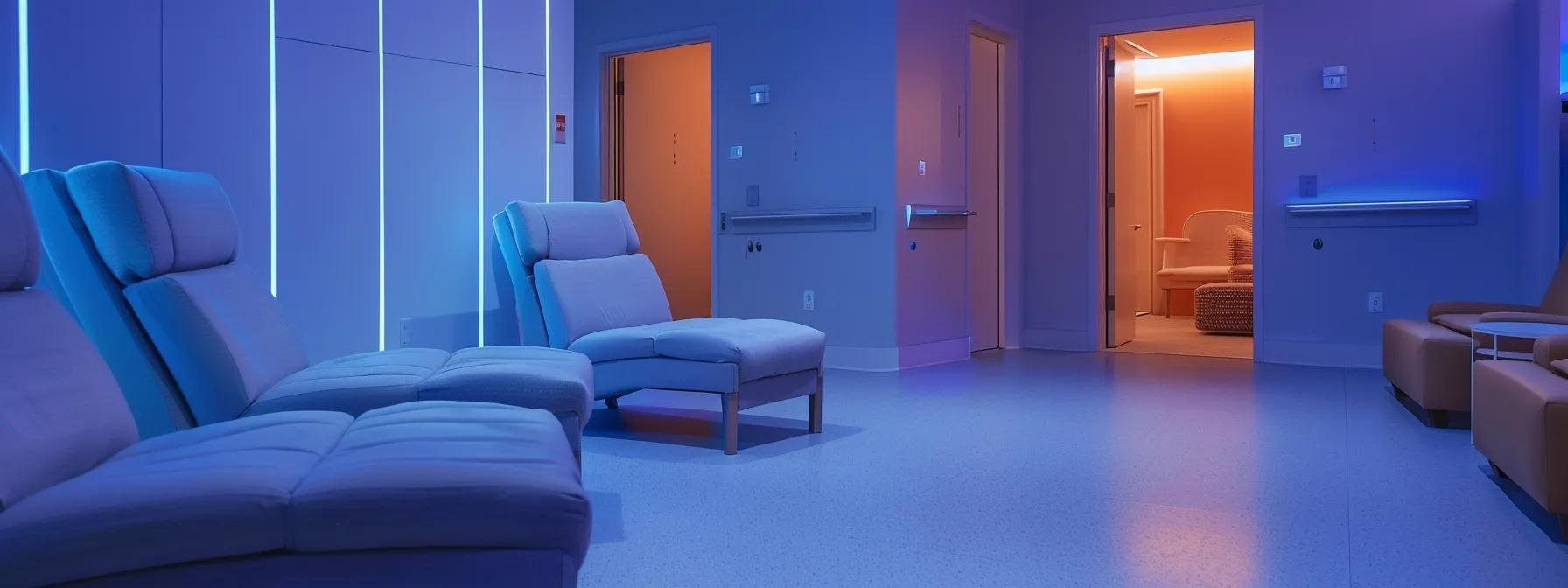Table Of Contents:
- Key Questions to Evaluate Whether Half Day IOP Suits Your Personal Recovery Needs
- Understanding What an Intensive Outpatient Program Involves
- Key Questions to Evaluate Whether Half Day IOP Suits Your Personal Recovery Needs
- How Can I Determine if Half Day IOP Is the Right Fit for My Needs?
- Signs That Indicate a Need for Intensive Outpatient Support
- Comparing IOP With Other Levels of Care for Your Situation
- Taking Action to Find the Appropriate IOP for You
- Frequently Asked Questions
Key Questions to Evaluate Whether Half Day IOP Suits Your Personal Recovery Needs
The journey through addiction recovery demands both self-reflection and guidance from experienced professionals. For families and individuals in Massachusetts facing drug and alcohol addiction, determining the appropriate level of care is a critical step. Intensive Outpatient Programs (IOP) offer a balance between structured treatment and the flexibility needed to maintain daily responsibilities. Strength Recovery Services in Weymouth, MA, provides a comprehensive exploration of the benefits and effectiveness of IOPs in supporting individuals on their path to recovery. By delving into the tailored approach of IOPs, the role of therapy, peer support, and holistic wellness practices within these programs can be better understood. By shedding light on how IOPs in Massachusetts, specifically at Strength Recovery Services, address the unique needs of each individual, this article aims to empower those seeking recovery to make informed decisions about their treatment journey.
Understanding What an Intensive Outpatient Program Involves
Intensive Outpatient Programs, or IOPs, are structured treatment approaches that strike a balance between inpatient care and traditional outpatient services. The foundation of an IOP is its flexibility, providing extensive therapeutic support while permitting patients to adhere to their daily routines. To begin, IOPs typically encompass a schedule of group and individual therapy sessions, educational classes, and various therapeutic modalities specifically aimed at helping patients manage their mental health challenges outside of a hospital setting. Additionally, IOPs often include psychoeducational workshops, family therapy sessions, and support groups to foster holistic healing and long-term recovery. Overall, the goal of an IOP is to empower individuals to develop coping strategies, enhance their emotional regulation skills, build a strong support network, and ultimately achieve sustainable mental wellness in their everyday lives.
Defining the Structure and Time Commitment of IOP
The structure of an IOP is defined by regular therapy sessions spread throughout the week, usually lasting a few hours per session. In a half day IOP, clients generally spend three to four hours per day—often in the morning or afternoon—in a treatment setting, engaging in a mix of therapeutic and educational activities. This level of commitment ensures that the patient receives intensive support without significantly disrupting daily responsibilities, such as work or school. The program typically includes scheduled breaks and periods of reflection, allowing patients to focus on their personal growth and mental well-being in a supportive environment. These moments of pause enable individuals to process their thoughts and emotions, developing self-awareness and coping strategies essential for their ongoing recovery journey. Additionally, the structured nature of an IOP instills a sense of routine and stability, fostering a sense of predictability and security in what can often be a turbulent time. By participating actively in their treatment and taking advantage of the resources offered, participants in an IOP can make significant strides towards improved mental health and overall well-being.
Identifying the Types of Therapies Offered in IOP in MA
Half day IOPs are known for offering a diverse range of therapeutic interventions. Among these, Cognitive Behavioral Therapy (CBT) plays a central role by focusing on the identification of negative thought patterns and substituting them with healthier alternatives. Additionally, Dialectical Behavioral Therapy (DBT) is frequently utilized, as it integrates mindfulness with behavioral change strategies, particularly for individuals with co-occurring mental health issues. Other therapies may include trauma-focused treatment and group therapy sessions which are essential for building a supportive community. Recreational therapy, which involves activities such as meditation and physical exercise, is also commonly incorporated to help manage stress and promote overall wellbeing. Medication-assisted treatments may be integrated when necessary, especially for those with severe dependency, ensuring that the full spectrum of care is addressed.
Recognizing the Goals of Intensive Outpatient Treatment
The objectives of an IOP are multifaceted, aiming to reduce relapse risk while providing comprehensive support. Primary goals include the stabilization of recovery, the enhancement of coping skills, and the prevention of relapse through regular, structured intervention. Clients are expected to learn how to manage triggers, develop healthy routines, and strategically utilize coping mechanisms in stressful situations. Through individual counseling and group interactions, patients also work on rebuilding their lives, enhancing interpersonal relationships, and setting long-term recovery goals. Programs are typically designed to empower participants with real-time strategies, thereby offering a safe space to discuss the challenges they face and to progress at a sustainable pace.
Who Typically Qualifies for an IOP Level of Care?
IOP is commonly recommended for individuals who have graduated from a more intensive level of care, such as residential treatment or Partial Hospitalization Programs (PHP), and are looking to transition back into everyday life. However, it is also suitable for new patients who require more support than standard outpatient treatment can offer, yet do not necessitate 24-hour care. Individuals with mild to moderate addiction issues, co-occurring mental health disorders, or those who require regular therapy sessions to maintain stability may qualify for half day IOPs. Importantly, participants are typically expected to have a reliable support system in place outside of treatment, as this enhances the effectiveness of the program.
Key Questions to Evaluate Whether Half Day IOP Suits Your Personal Recovery Needs

Determining whether a half day Intensive Outpatient Program fits your needs involves self-assessment along several critical dimensions. Through a series of key questions, individuals can explore how their current situation and recovery goals align with the benefits offered by a half day IOP. The focus is on understanding your own mental health challenges, schedule constraints, and recovery motivation. These questions are designed to assist users in critically evaluating their ability to integrate intensive treatment with other life responsibilities.
Assessing Your Current Mental Health or Addiction Severity
The first step in evaluating suitability for a half day IOP is to take an honest look at your current mental health status and the severity of your addiction. Ask yourself: Are the symptoms of substance abuse and any co-occurring mental illnesses manageable at a level that might benefit from additional, yet flexible, therapy sessions? Clinical assessments often indicate that individuals experiencing moderate withdrawal symptoms or relapse risk may benefit from the structured yet adaptable schedule of a half day IOP. This method of treatment is particularly useful if your condition does not require immediate inpatient stabilization but would benefit from the regular support and therapy provided in an intensive outpatient program. By participating in a half day IOP, individuals can receive the necessary interventions and counseling while still maintaining their daily routines and responsibilities outside of treatment. This balance can be instrumental in fostering long-term recovery and equipping individuals with the tools needed to manage their addiction and mental health challenges effectively.
Can Your Daily Responsibilities Accommodate a Half Day Program in MA Schedule?
Another vital question to consider is whether your daily responsibilities are compatible with the half day format. Many individuals and families in recovery face the challenge of balancing treatment with work, parenting, or educational commitments. A half day IOP is designed specifically for those who cannot afford to take full days off without significant disruption to their lives. It offers the possibility of attending treatment sessions while still managing work-related tasks or family care during non-treatment hours. Evaluating your ability to rearrange your schedule—to perhaps attend sessions in the morning and then resume work in the afternoon—can provide clarity on whether a half day is practical for you. This balance is essential to ensure that treatment does not become an additional source of stress.
Do Your Specific Recovery Goals Align With Half Day IOP in MA Services?
Recovery goals vary widely and are highly personal. It is important to consider whether your objectives correspond with what a half day IOP can offer. For instance, if you aim to rebuild your social networks or learn advanced coping strategies through group therapy, an IOP that offers frequent sessions and interactive group settings may be beneficial. Conversely, if your goals require also intensive medical supervision or round-the-clock care, then a more intensive treatment format might be necessary. By aligning your recovery goals—such as reducing relapse risk, enhancing daily functioning, and boosting emotional stability—with the services provided in a half day IOP, you can ensure that your treatment plan is both realistic and effective. Discussing these goals with a clinician can further help in determining the best match for your individual needs.
Examining Your Support System Outside of Formal Treatment
Recovery is never a journey taken alone. The support system you have—in the form of family, friends, or community networks—plays a crucial role. When evaluating whether a half day IOP is the right choice, consider if you have strong external support that can help you reinforce the skills learned during therapy. External support is essential for managing triggers and providing emotional grounding during challenging times. Those with robust support networks may find that the self-management and aftercare components of a half day IOP are sufficient. Meanwhile, individuals without reliable support might require additional interventions or prefer a more structured environment, such as full day treatment programs, where peer support is more intensively integrated.
Are You Stepping Down From a Higher Level of Care?
A significant indicator for considering a half day IOP is if you are transitioning from a more intensive level of care. Many patients leave residential treatment or PHP with a plan to step down to an IOP as they begin to manage life outside of an all-encompassing treatment environment. In such cases, a half day IOP provides continuity of care while allowing for greater independence. It acts as a bridge between intensive inpatient support and standard outpatient therapy. Evaluating whether your progress and stability are sufficient for a lower intensity program is a critical part of the decision-making process. As recovery continues, the need for structure changes, and a half day IOP often supports the gradual assumption of more personal responsibility in the recovery journey.
How Can I Determine if Half Day IOP Is the Right Fit for My Needs?
Deciding if a half day Intensive Outpatient Program in MA is the right fit involves reflecting on a range of factors from personal progress in previous treatments to your daily functionality. This section explores thought-provoking questions and criteria designed to help individuals gauge whether their current status and long-term goals align with the half day IOP format. By addressing these criteria, patients can create a clearer picture of their readiness for a half day model and understand how it may work in conjunction with their existing recovery plan.
Reflecting on Your Progress With Current or Past Treatments
One of the first steps is to evaluate your history with previous treatment programs. Ask yourself: Have you experienced improvements in your symptoms from prior interventions, such as full-day treatments or standard outpatient therapy? Reflect on your progress in terms of reduced relapse rates and improved coping mechanisms. Individuals who have successfully completed higher intensity levels of care but still feel the need for structured support on a day-to-day basis are often ideal candidates for half day IOPs. Evidence from clinical studies suggests that patients who transition to less intensive treatment while still relying on regular therapy sessions maintain better long-term outcomes. This stage-wise reduction in structure can help sustain improvements without overwhelming external responsibilities.
Considering the Need for More Structure Than Weekly Therapy
Another critical consideration is whether your current weekly therapy sessions are sufficient. Many individuals find that a once-a-week meeting does not provide adequate structure and reinforcement of new skills. A half day IOP offers additional sessions throughout the week, increasing the frequency of therapeutic interventions. This can be particularly beneficial for those whose recovery is still in a fragile stage, or who need more routine to combat the unpredictable nature of addiction recovery. Evaluative questions should include: Do you feel that the infrequency of sessions leaves you without sufficient guidance on high-stress days? Are you seeking more opportunities for group interaction and skill-building? An increased touchpoint provided by a half day IOP may significantly improve outcomes by enabling more immediate application of coping strategies and consistent support.
Evaluating Your Ability to Function Independently While Attending Treatment
Another important question is the extent to which you are able to function independently between therapy sessions. Half day IOPs are designed for individuals who have a degree of stability and self-management but still require structured guidance. The program encourages patients to utilize learned strategies independently during the hours outside treatment. This requires a baseline level of self-discipline and motivation. Evaluate your day-to-day functioning—do you manage your responsibilities effectively, and can you integrate therapeutic practices into your daily routine? A well-developed sense of independence is essential for success in a half day IOP, as it ensures that when you are not in the treatment program, you can already begin applying what you have learned to real-life situations.
Determining if a Group Therapy Setting Is Beneficial for You
Group therapy is a core component of most IOPs, including half day formats. This setting offers a chance for peer support and shared learning experiences which are invaluable in the recovery process. Consider: Do you benefit from hearing the experiences of others, and do you feel supported in a group setting? Group dynamics can enhance recovery by providing social reinforcement and reducing feelings of isolation. At Strength Recovery Services, group sessions are structured to foster open communication and accountability among participants. If you find that one-on-one therapy does not address all your emotional and social needs, a group therapy setting may provide additional benefits by building a community that uplifts and motivates. This environment can be particularly effective for learning new ways to handle triggers and stress from individuals who have faced similar challenges.
Consulting With a Healthcare Professional for an Assessment
Ultimately, while self-reflection is invaluable, professional guidance is essential in choosing the right level of care. Consulting with an experienced addiction specialist or therapist allows you to receive an objective assessment of your recovery progress and needs. A professional assessment will consider your mental health status, support structure, and previous treatment outcomes. During assessments at Strength Recovery Services, clinicians evaluate these factors through detailed interviews, standardized tests, and behavioral observations. Questions such as “Can you manage stress independently?” or “How consistent have you been with your therapy goals?” are explored in depth.
Signs That Indicate a Need for Intensive Outpatient Support

Recognizing when additional support is needed can be a turning point in addiction recovery. The transition to a half-day Intensive Outpatient Program (IOP) is often signaled by specific indicators that suggest current resources are insufficient for maintaining recovery. These signs include difficulty in managing daily responsibilities, overwhelming stress, or even the onset of relapse triggers. Understanding these signs and openly acknowledging them is the first and most important step towards successful recovery. This section outlines the key indicators that signal the need for a half-day IOP, providing a clear framework for evaluation.
Experiencing Difficulty Managing Symptoms With Less Intensive Care
One of the primary indicators that more structured care is needed is the difficulty in managing symptoms with less intensive treatment. For many individuals, standard outpatient therapy may not provide enough frequent intervention to counter the unpredictable nature of addictive behaviors. When symptoms such as persistent cravings, mood fluctuations, or anxiety begin to interfere with daily functioning, this can signal the need to step up care. Clinical evidence supports that patients who transition to a more structured program after experiencing difficulties on traditional outpatient plans often report improved symptom management. If you or your loved ones notice that your ability to maintain a balanced life is diminishing—as seen in missed workdays or declining social relationships—it may be time to consider a more intensive level of care, such as an intensive outpatient program (IOP) or residential treatment center where you can receive closer monitoring and support to address the challenges you are facing. By seeking a higher level of care, you can access a more comprehensive treatment approach that may better suit your current needs and help you regain control over your symptoms and daily life. Don’t hesitate to reach out to healthcare professionals or addiction specialists for guidance and support in making this decision. Your well-being and recovery are important, and there are resources available to assist you on your journey towards healing.
Requiring a Structured Environment to Prevent Relapse or Worsening Symptoms
Another key sign is the need for a structured environment, particularly for preventing relapse. Addiction recovery hinges on consistency and routine. A half day IOP introduces regular, scheduled sessions that provide ongoing accountability and reinforcement of coping strategies. The structured schedule helps reduce the likelihood of relapse by keeping daily routines consistent and offering immediate professional support when triggers occur. Consistent attendance in a semi-structured setting ensures that patients are continuously engaged in their treatment plan, thereby reinforcing their commitment to recovery. If you find that unstructured time often leads to negative behaviors or heightened anxiety, this is a clear indicator that intensive outpatient support may be beneficial.
Needing Comprehensive Support for Co-Occurring Conditions
Many individuals facing substance abuse challenges may also be dealing with co-occurring mental health conditions, such as depression, bipolar disorder, or anxiety disorders. When these additional conditions compound the difficulties of recovery, a half day IOP that offers comprehensive support becomes not just beneficial but essential. An integrated treatment model that addresses both addiction and co-occurring issues through individual and group therapy sessions, medication management, and holistic therapies ensures that clients receive well-rounded care. Recognizing that treating one condition in isolation is often ineffective is crucial; thus, if you are experiencing overlapping symptoms or worsening mental health, it may indicate that the intense support provided by a Half Day IOP is necessary.
Finding That Daily Life Stressors Overwhelm Your Coping Mechanisms
Daily stressors ranging from work-related pressures to family conflicts can significantly affect recovery. If you find that everyday challenges are overwhelming your capacity to manage stress—resulting in increased cravings or withdrawal symptoms—this is a serious sign that additional support is needed. A half day IOP helps by providing regular intervals of professional guidance and peer support, thereby equipping you with strategies to handle stress more constructively. This structured, therapeutic input acts as a buffer during particularly stressful days and reinforces your ability to maintain sobriety. Regular, scheduled meetings help to build resilience against the cumulative effects of daily life stressors.
Seeking to Build a Stronger Foundation for Long-Term Recovery
Finally, another important sign is the recognition that a stronger, more structured foundation is needed for long-term recovery. Even if you feel relatively stable, ongoing challenges with substance abuse can persist in subtle forms. Building a strong foundation involves not only managing cravings and symptoms but also developing new habits, communication skills, and healthy lifestyle choices. A half day IOP provides a consistent and supportive environment where you can gradually strengthen these foundations. Continuous feedback from clinicians and supportive interactions with peers help to solidify these changes. This investment in a structured setting demonstrates a commitment to sobriety rather than a temporary fix.
Comparing IOP With Other Levels of Care for Your Situation
When determining the optimal treatment program, it is helpful to understand how Intensive Outpatient Programs compare with other levels of care. Each treatment model offers distinct advantages and is structured to meet different needs. In this section, the discussion turns to a comparison between IOP, Residential Treatment, Partial Hospitalization Programs (PHP), standard outpatient therapy, and inpatient care. By examining key factors such as intensity, structure, flexibility, and overall support levels, one can better decide which treatment program pathway fits individual recovery needs.
IOP Versus Residential Treatment: What Are the Distinctions?
Residential treatment programs offer the most intensive form of care because they provide 24-hour supervision and support in a controlled environment. These programs are ideal for individuals with severe addiction or who are at high risk of relapse due to unstable home environments. In contrast, IOPs, particularly half day models, allow patients to live at home and maintain daily responsibilities while still receiving intensive therapeutic support during controlled hours. Residential programs often involve significant lifestyle changes and can be isolating, while IOPs emphasize reintegration into daily life with structured treatment sessions. The key distinction lies in the balance between treatment intensity and everyday functionality, with a less disruptive yet still highly structured approach.
IOP Compared to Partial Hospitalization Programs (PHP)
Partial Hospitalization Programs (PHP) are situated between residential treatment and IOP in terms of intensity. PHPs typically require patients to attend treatment for most of the day but allow for some periods at home. They are generally used for patients who need more intensive support than an outpatient program can offer, yet not full residential care. A half day IOP, as offered by Strength Recovery Services, provides a less time-intensive option that is best suited for individuals who are feeling stable yet still need structured support to avoid relapse. The primary benefit of a half day IOP over PHP is the flexibility it provides, allowing patients to gradually transition back into normal routines while still receiving essential therapeutic guidance.
When Is Standard Outpatient Treatment Sufficient?
Standard outpatient treatment is appropriate for individuals whose recovery status is relatively stable, and who can manage their symptoms effectively with weekly therapy sessions. This model usually involves one or two sessions a week with minimal disruption to daily activities, making it ideal for those with strong personal support systems and a lower risk of relapse. However, if you find that occasional check-ins are insufficient to manage persistent cravings or stressors, an IOP may offer the additional regularity needed to reinforce recovery strategies. Standard outpatient treatment is generally best for those in the maintenance phase of recovery, where the risk of relapse is low and the individual is capable of independently applying coping techniques learned during therapy. For more information, visit Strength Recovery Services for further options.
Understanding When Inpatient Care Is a More Suitable Option
Inpatient care, or residential treatment, is indicated for those whose conditions require round-the-clock supervision and intensive medical or psychological support. This level of care is essential for individuals who are medically unstable or have safety concerns that necessitate constant monitoring. In many cases, inpatient care is only a temporary phase, with patients stepping down to IOP or outpatient programs as they stabilize. The decision to pursue inpatient treatment is often driven by the severity and complexity of the addiction. If the intensity of withdrawal or co-occurring disorders is high, inpatient care offers the immediate intervention needed for safety and stabilization. For those transitioning from such acute care settings, a common next step is to enter a structured outpatient program or intensive outpatient program (IOP) for ongoing support and therapy. This gradual shift from intensive inpatient care to a less restrictive level of care allows individuals to continue their recovery journey while gradually reintegrating into their daily lives. It also provides a continuum of care that ensures patients receive the necessary support as they navigate the challenges of maintaining sobriety and addressing underlying issues. By transitioning to outpatient programs, individuals can further build upon the progress made during inpatient treatment and develop the skills needed for long-term recovery and relapse prevention.
Taking Action to Find the Appropriate IOP for You

Once you have weighed the key questions and recognized the signs for intensive support, the next step is to take actionable measures to find the appropriate Intensive Outpatient Program. This phase involves seeking professional recommendations, evaluating program providers, and preparing for the intake process. Strength Recovery Services, with its comprehensive approach tailored to those recovering from substance use disorders in Massachusetts, offers a range of options, including half day IOPs. The following sections provide concrete guidelines on how to actively engage with the treatment selection process, including what to ask and how to prepare for this crucial step in your journey.
How to Get a Professional Recommendation for IOP
The first step towards securing the appropriate treatment is to obtain a professional evaluation from a clinician who specializes in addiction treatment. A certified therapist or a registered nurse in an addiction recovery setting will conduct an initial assessment that considers your medical history, the severity of your addiction, and your current life circumstances. During this assessment, professionals ask targeted questions that evaluate your readiness for a
versus other levels of care. At Strength Recovery Services, assessments are comprehensive and data-driven, ensuring that recommendations are based on evidence and tailored to the individual’s unique needs. Timely consultation can help you understand the benefits and limitations of each treatment level, thereby guiding you in making the most informed decision.
What to Look for in an Intensive Outpatient Program Provider
Choosing the right IOP provider hinges on evaluating several critical factors. Look for a program that offers evidence-based therapies, such as CBT and DBT, along with additional support like family or group therapy sessions. A reputable provider should have experienced, licensed clinicians who demonstrate a clear understanding of addiction and mental health challenges. Additionally, consider the program’s flexibility, location, and scheduling options. For instance, half day IOPs should provide comprehensive treatment sessions that fit within your daily routine without causing significant disruptions. Accreditation and success rates are also important—programs with high approval and recovery rates indicate the reliability of the treatment provided. Reviews and testimonials from former patients can be highly informative in assessing the program‘s effectiveness and overall support structure.
Preparing for an Intake Assessment for an IOP
An intake assessment is the formal process by which a provider gathers detailed information about your addiction history, current challenges, and personal goals for recovery. To prepare, compile all relevant medical records, previous treatment documentation, and any prescriptions you are currently following. It can be beneficial to reflect on your recovery journey and note specific areas where you have faced challenges, such as managing stress or coping with triggers. During the intake assessment, the clinician will evaluate these details to recommend the most appropriate treatment level. Being well-prepared not only shortens the assessment process but also helps you communicate your needs clearly. A thorough and honest assessment ensures that the chosen program, such as a half day IOP, will adequately support your path toward sustained sobriety.
Questions to Ask to Ensure a Program Meets Your Recovery Needs
During your search for an IOP, it is helpful to have a set of questions ready to ensure that the program matches your expectations and requirements. Some critical questions to ask include: What specific therapies are included in the half day IOP? How frequently are sessions conducted, and what is the format of each session? What support systems are in place for managing relapse risk? Additionally, inquire about the credentials and experience of the clinicians involved, the program’s success rates, and the extent of aftercare support provided. These questions not only help clarify the structure of the program but also ensure that you are comfortable with the treatment environment and confident in its ability to facilitate your recovery. The answers will help solidify your decision and build trust in the treatment process. It’s essential to gather as much information as possible before committing to an Intensive Outpatient Program (IOP) to ensure that it aligns well with your needs and goals for recovery. By asking these questions and seeking detailed responses, you can make an informed decision about the best course of treatment for your situation.
Frequently Asked Questions
Q: What distinguishes a half day IOP from other outpatient services? A: A half day Intensive Outpatient Program offers more structured, frequent sessions than standard outpatient therapy while still allowing patients to maintain their daily responsibilities. It is designed for individuals who need regular, intensive support without the full commitment of residential care. Programs like these incorporate group and individual therapy sessions, educational workshops, and real-time behavioral interventions to reinforce recovery while providing flexibility. This model is especially beneficial for those transitioning from higher-level care, as it bridges the gap between intensive inpatient settings and self-managed outpatient treatment. half day iop
Q: How do I know if my current treatment plan is insufficient for my recovery needs?A: If you are experiencing persistent cravings, mood fluctuations, or a sense of being overwhelmed by daily stressors despite attending weekly therapy sessions, these are clear indicators that your current treatment plan might be insufficient. Additionally, if you find it challenging to apply the coping skills learned during therapy to your everyday life, or if you have experienced recent relapses, it’s wise to consider upgrading to a more structured program such as a half day IOP. A professional assessment can further help in determining whether your recovery could benefit from more frequent, intensive support.
Q: What role does group therapy play in a half day IOP, and how effective is it? A: Group therapy is a cornerstone of half day IOPs. This setting provides a supportive community where individuals share their experiences, gain insight from peers, and learn practical coping strategies. Research has consistently shown that group therapy enhances accountability and emotional support, leading to better recovery outcomes. The collaborative nature of group sessions helps clients understand they are not alone in their struggles, fostering a sense of belonging and mutual encouragement. At centers like Strength Recovery Services, group sessions are tailored to complement individual therapy, ensuring that all participants receive comprehensive support throughout their recovery journey. half day IOP
Q: Can I transition from a half day IOP to other levels of care if needed? A: Yes, the flexible structure of half day IOPs is designed to facilitate transitions in and out of higher levels of care. If a patient’s condition improves significantly, they may step down to standard outpatient therapy. Conversely, if challenges resurface or if additional support is needed, transitioning back to a Partial Hospitalization Program (PHP) or even residential care is possible. This tiered approach to addiction treatment ensures that individuals receive the precise level of support necessary at each stage of recovery. Ongoing evaluations and close communication with a treatment provider help manage these transitions effectively, ensuring continuity of care.
Q: How do I prepare myself and my family for enrolling in a half day IOP? A: Preparation for enrolling in a half day IOP involves both self-reflection and coordinated support from family members. On a personal level, it’s important to compile your medical history, document any previous treatment experiences, and identify key stressors in your daily life. Simultaneously, engaging your family in informational sessions can build a stronger support network, ensuring that everyone understands the structure and goals of the program. Discuss practical matters such as scheduling, transportation, and how family members can assist during difficult times. This comprehensive preparation sets clear expectations and fosters an environment conducive to lasting recovery.
Q: What evidence supports the effectiveness of half day IOPs? A: Multiple studies and clinical reports support the effectiveness of half day IOPs by highlighting their success in reducing relapse rates and improving overall mental health outcomes. Data from various treatment centers have shown that patients participating in intensive outpatient programs experience significant improvements in coping skills and emotional regulation. Regular attendance and a structured therapeutic environment enable a smoother transition from higher levels of care. Additionally, elements like group therapy have been linked with higher patient satisfaction and enhanced recovery resilience. The evidence indicates that a half day IOP serves as an effective intermediary step in a comprehensive recovery strategy.
Q: How can I access Strength Recovery Services’s IOP services and assess if it is the right fit for my needs? A: To access IOP services at Strength Recovery Services, individuals can start by arranging a professional evaluation through our intake process. During this assessment, clinicians thoroughly review your treatment history, current challenges, and recovery goals. The process includes detailed consultations and possibly a trial period in the program to gauge suitability. You can reach out directly to the center for more information, schedule an appointment, or attend an informational session. This proactive engagement ensures that the right level of care is determined, aligning the treatment plan with your specific recovery journey.



